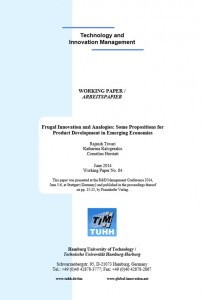Auf dem Weg hin zur Entwicklung frugaler Produkte begleiten TUHH-Wirtschaftswissenschaftler interessierte Unternehmen
Frugal. Was der Duden dazu schreibt
„Frugal leitet sich her aus dem Lateinischen. Frugalis bedeutet zu den Früchten gehörig und fruchtig. Im Alltag bezieht sich das eher selten genutzte Adjektiv im Besonderen auf das Leben allgemein, Essen und Trinken, das als frugal beschrieben durch Einfach- und Bescheidenheit besticht. Als mögliche Synonyme bietet der Duden u.a. an: anspruchslos, ärmlich, armselig, bescheiden, einfach, genügsam, karg, kärglich, kümmerlich, puritanisch, schlicht, spärlich, spartanisch.“
Weniger ist mehr. Diese Lebensphilosophie der Bescheidenheit ist auf dem Weg zu einem erfolgversprechenden Verkaufsmodell in Schwellenländern wie Indien und China. Mit einfachen, aber guten, sprich frugalen Produkten, wollen sich deutsche Unternehmen in Schwellenländern positionieren. Bisher jedoch gelingt es nur wenigen von ihnen, ihre gewohnt hohen Qualitätsstandards zu reduzieren und mit einem erschwinglichen und gleichzeitig funktionalen, robusten Produkt Kaufinteresse zu wecken.


